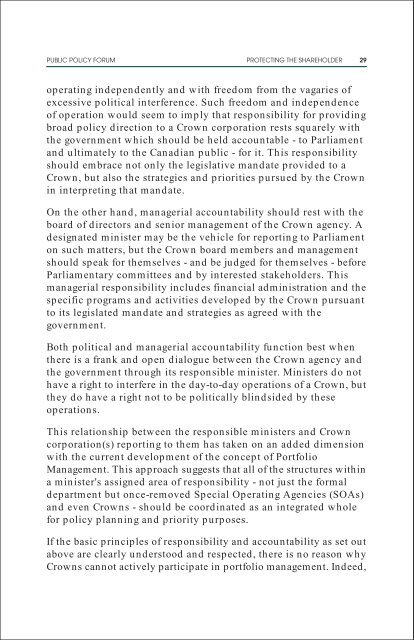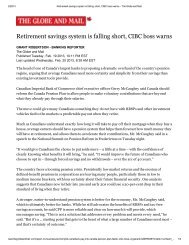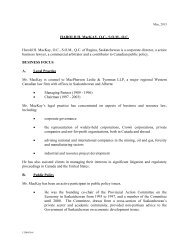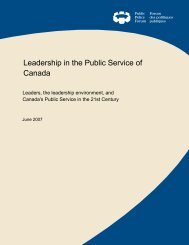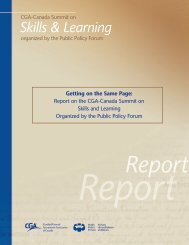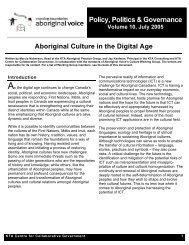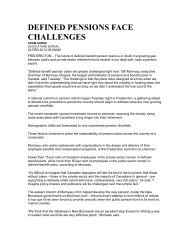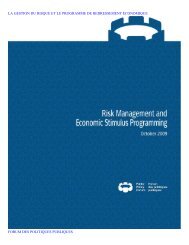Protecting the Shareholder - Public Policy Forum
Protecting the Shareholder - Public Policy Forum
Protecting the Shareholder - Public Policy Forum
You also want an ePaper? Increase the reach of your titles
YUMPU automatically turns print PDFs into web optimized ePapers that Google loves.
PUBLIC POLICY FORUM PROTECTING THE SHAREHOLDER 29 PUBLIC POLICY FORUM PROTECTING THE SHAREHOLDER 30operating independently and with freedom from <strong>the</strong> vagaries ofexcessive political interference. Such freedom and independenceof operation would seem to imply that responsibility for providingbroad policy direction to a Crown corporation rests squarely with<strong>the</strong> government which should be held accountable - to Parliamentand ultimately to <strong>the</strong> Canadian public - for it. This responsibilityshould embrace not only <strong>the</strong> legislative mandate provided to aCrown, but also <strong>the</strong> strategies and priorities pursued by <strong>the</strong> Crownin interpreting that mandate.On <strong>the</strong> o<strong>the</strong>r hand, managerial accountability should rest with <strong>the</strong>board of directors and senior management of <strong>the</strong> Crown agency. Adesignated minister may be <strong>the</strong> vehicle for reporting to Parliamenton such matters, but <strong>the</strong> Crown board members and managementshould speak for <strong>the</strong>mselves - and be judged for <strong>the</strong>mselves - beforeParliamentary committees and by interested stakeholders. Thismanagerial responsibility includes financial administration and <strong>the</strong>specific programs and activities developed by <strong>the</strong> Crown pursuantto its legislated mandate and strategies as agreed with <strong>the</strong>government.Both political and managerial accountability function best when<strong>the</strong>re is a frank and open dialogue between <strong>the</strong> Crown agency and<strong>the</strong> government through its responsible minister. Ministers do nothave a right to interfere in <strong>the</strong> day-to-day operations of a Crown, but<strong>the</strong>y do have a right not to be politically blindsided by <strong>the</strong>seoperations.This relationship between <strong>the</strong> responsible ministers and Crowncorporation(s) reporting to <strong>the</strong>m has taken on an added dimensionwith <strong>the</strong> current development of <strong>the</strong> concept of PortfolioManagement. This approach suggests that all of <strong>the</strong> structures withina minister's assigned area of responsibility - not just <strong>the</strong> formaldepartment but once-removed Special Operating Agencies (SOAs)and even Crowns - should be coordinated as an integrated wholefor policy planning and priority purposes.If <strong>the</strong> basic principles of responsibility and accountability as set outabove are clearly understood and respected, <strong>the</strong>re is no reason whyCrowns cannot actively participate in portfolio management. Indeed,it would seem logical that Crowns <strong>the</strong>mselves could benefit from aclear understanding of <strong>the</strong> broad over-arching policy directionsbeing pursued by <strong>the</strong>ir ministers across <strong>the</strong>ir portfolios. At <strong>the</strong> sametime, <strong>the</strong> process of developing and communicating <strong>the</strong>se directionscould benefit from having <strong>the</strong> perspective and expertise of a Crownagency. But such participation in portfolio management need notthreaten <strong>the</strong> ultimate arms length managerial independence ofCrowns.Portfolio management also helps bring into focus <strong>the</strong> role of <strong>the</strong>responsible minister's deputy minister in <strong>the</strong> relationship withvarious Crowns. The deputy minister is not a gate keeper or a filterin a Crown's relationship with its responsible minister. Crown chairsand senior management have, or should have, direct access to <strong>the</strong>irrespective ministers. But as <strong>the</strong> ministers most senior adviser onvirtually all matters within <strong>the</strong> minister’s portfolio, <strong>the</strong> deputyshould be informed of and consulted on important issues being putbefore <strong>the</strong> minister. The result may be differences in <strong>the</strong> adviceoffered <strong>the</strong> minister, but <strong>the</strong>se differences will reflect <strong>the</strong> particularperspectives inherent in each of <strong>the</strong>ir roles - and will not necessarilybe <strong>the</strong> result of unproductive jealousies or simple turf battles.To sum up this complex relationship, Crown corporations are bydefinition closely-held corporations and <strong>the</strong>ir dominant shareholder- <strong>the</strong> government - rightfully should provide strong policy andstrategic direction. What is required are Crown boards of directorswith sufficient competence, authority, and arms-lengthindependence to translate that broad direction into effective andefficiently managed operating plans and programs.The Appointment ProcessOne place to improve Crown corporation governance is <strong>the</strong> processthrough which directors are appointed to serve on Crown boards.The issue is not whe<strong>the</strong>r <strong>the</strong> government should exercise <strong>the</strong> rightto appoint individuals to <strong>the</strong>se boards. Appointment of directors isa fundamental shareholder prerogative whe<strong>the</strong>r corporations arepublic or private, widely or closely held. (The procedure adoptedin recent years of having appointees to significant federal Crowncorporations examined by <strong>the</strong> appropriate Parliamentary committee,


